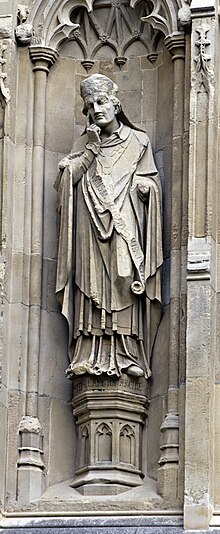Stephen Langton
| Stephen Langton | |
|---|---|
| Cardinal, Archbishop of Canterbury Primate of All England |
|

Statue of Langton from the exterior of Canterbury Cathedral
|
|
| Appointed | c, 1207 |
| Term ended | 9 July 1228 |
| Predecessor | John de Gray |
| Successor | Walter d'Eynsham |
| Orders | |
| Consecration | 17 June 1207 by Innocent III |
| Created Cardinal | 1206 |
| Rank | Cardinal priest |
| Personal details | |
| Born | c. 1150 |
| Died | 9 July 1228 Slindon, Sussex |
| Buried | Canterbury Cathedral |
| Nationality | English |
| Denomination | Roman Catholic |
| Parents | Henry Langton |
Stephen Langton (c. 1150 – 9 July 1228) was an English Cardinal of the Roman Catholic Church and Archbishop of Canterbury between 1207 and his death in 1228. The dispute between King John of England and Pope Innocent III over his election was a major factor to the crisis which produced Magna Carta in 1215. Cardinal Langton is also credited with having divided the Bible into the standard modern arrangement of chapters used today.
His father was Henry Langton , a land owner in Langton by Wragby, Lincolnshire. Stephen Langton may have been born in a moated farmhouse in the village, and was probably educated in his local cathedral school.
Stephen studied at the University of Paris and lectured there on theology until 1206, when Pope Innocent III, with whom he had formed a friendship in Paris, called him to Rome and made him cardinal-priest of San Crisogono, Rome. His piety and learning had already won him prebends in Paris and York and he was recognised as the foremost English churchman.
His brother Simon Langton was elected Archbishop of York in 1215, but that election was quashed by Pope Innocent III. Simon served his brother Stephen as Archdeacon of Canterbury in 1227. Simon and Stephen had another brother named Walter, a knight who died childless.
On the death of Hubert Walter, Archbishop of Canterbury, in 1205, some of the younger monks elected to the see Reginald, the subprior of Christ Church, Canterbury, while another faction under pressure from King John chose John de Grey, Bishop of Norwich. Both elections were quashed on appeal to Rome and sixteen monks of Christ Church, who had gone to Rome empowered to act for the whole chapter, were ordered to proceed to a new election in presence of the Pope. Langton was chosen and was consecrated by the Pope at Viterbo on 17 June 1207.
...
Wikipedia
